19 Mar 18 | Campaigns -- Featured, Statements, United Kingdom
[vc_row][vc_column][vc_column_text]The UK government has barred a number of far-right speakers from entering the country in recent weeks.
Index on Censorship does not believe that preventing individuals from visiting the UK or speaking here is the right approach to tackling hateful views. We believe that the best way to tackle ideas with which you disagree, including bigoted ones, is to allow discussion about them to take place so they can be openly countered.
If you feel people’s arguments are hateful then the best way to expose that is in debate. Banning people simply adds to their status, often increases their profile and makes the arguments more popular. It does nothing to eradicate those views. The only grounds on which a speaker or speech should be banned is when it directly incites violence.
[/vc_column_text][/vc_column][/vc_row][vc_row][vc_column][vc_basic_grid post_type=”post” max_items=”2″ element_width=”6″ grid_id=”vc_gid:1521459623353-4984cb7f-fee6-7″ taxonomies=”737″][/vc_column][/vc_row][vc_row][vc_column][vc_custom_heading text=”Don’t lose your voice. Stay informed.” use_theme_fonts=”yes”][vc_separator color=”black”][vc_row_inner][vc_column_inner width=”1/2″][vc_column_text]Index on Censorship is a nonprofit that campaigns for and defends free expression worldwide. We publish work by censored writers and artists, promote debate, and monitor threats to free speech. We believe that everyone should be free to express themselves without fear of harm or persecution – no matter what their views.
Join our mailing list (or follow us on Twitter or Facebook) and we’ll send you our weekly newsletter about our activities defending free speech. We won’t share your personal information with anyone outside Index.[/vc_column_text][/vc_column_inner][vc_column_inner width=”1/2″][gravityform id=”20″ title=”false” description=”false” ajax=”false”][/vc_column_inner][/vc_row_inner][vc_separator color=”black”][/vc_column][/vc_row]
19 Mar 18 | Campaigns -- Featured, Press Releases
 A fund of up to €450,000 to support cross-border investigative journalism in the European Union is being launched today by the European Centre for Press and Media Freedom (ECPMF) and the International Press Institute (IPI).
A fund of up to €450,000 to support cross-border investigative journalism in the European Union is being launched today by the European Centre for Press and Media Freedom (ECPMF) and the International Press Institute (IPI).
The Investigative Journalism for Europe (#IJ4EU) fund is intended to foster and strengthen collaboration among European Union-based journalists and newsrooms on revelations in the public interest and of cross-border significance. The fund aims to support investigations that reflect the media’s watchdog role and that assist the public in holding those in power accountable for their actions and to their obligations. In so doing, it seeks to contribute to the sustainability of democracy and the rule of law in the EU.
The fund will be managed by IPI, a global network of editors, media executives and leading journalists defending press freedom.
In 2018 cross-border teams of investigative reporters and/or media outlets based in at least two EU countries can apply for grants up to a maximum of €50,000 to produce investigations on a topic of cross-border relevance and of public interest.
Proposed projects must aim to reveal new information. Investigative teams already in existence or formed for an #IJ4EU project are equally welcome to apply. Ongoing but incomplete investigations are eligible to apply for funds to complete a publishable story. Teams of journalists or media outlets based outside of the capitals or largest cities or in countries where investigative journalism is at particular risk are especially encouraged to apply.
The programme will consider funding all platforms, including print, broadcast, online media, documentary filmmaking and multi-platform story-telling.
To be eligible for funding, proposed projects must aim to be published (and available in publishable form) by respected news outlets or platforms in at least two EU countries no later than December 31, 2018.
The deadline for applications is May 3, 2018, which also marks World Press Freedom Day. Applications must be submitted in English. Applicants will need to provide a detailed project description, information on the investigative team, a research and publication plan, a budget, and a risk assessment.
An independent jury will select the projects to be funded, with the aim of concluding agreements with all successful applicants by June 15, 2018.
To apply and to read full information about eligibility, applications and the selection process, please visit the fund’s website: http://www.ij4eu.net/
“Investigative journalism, which performs an essential service in any functioning democracy, is under pressure across the EU”, IPI Executive Director Barbara Trionfi said. “Providing financial support to investigative projects is a way of helping ensure that information on issues such as corruption, financial crime, human rights abuses and environmental damage reaches the public.”
She added: “As such investigations are nowadays rarely confined to a single state, it is critical for teams of journalists to work across borders on issues. We are proud that #IJ4EU will provide an opportunity do so.”
For any questions, please contact:
Javier Luque
Head of Digital Media
IPI
Email: [email protected]
Tel.: +43 1 5129011
19 Mar 18 | Awards, Fellowship 2018, News and features
[vc_row][vc_column][vc_video link=”https://youtu.be/tNKQ_C9VxKY”][vc_column_text]Jamal Ali is a young Azerbaijani rapper living in exile in Berlin who – with one song – challenged the authoritarian regime of President Ilham Aliyev this year. His contribution is significant because he is one of the few musicians from the former Soviet Bloc channelling social protest through his music, and getting a reaction back home.
The song in question, was released by Ali on New Year’s Eve 2016. It criticised human rights violations in Azerbaijan, particularly the torture and 10-year prison sentence meted out to two young men who desecrated the statue of the president’s father. The song was called Heykəl Baba (Monument Grandpa). Azerbaijan’s authorities arrested Ali’s mother and threatened his relatives who were still living in Azerbaijan. They said they would not release Ali’s mother until he took down the song from YouTube.
“It was the first time I saw so many people having courage to start and proceed such a campaign. It was a huge support and amazing feeling to know, that so many people understand how is it to lead a fight alone. Because my mother was involved, there was a huge emotional side of the story too. It became our fight together, there was a big feeling of unity, which we miss very much in our country” Ali said.
They also threatened to fire 40 of his relatives from their jobs and impose a travel ban on them. The way the government reacted sent the music video viral on social media sites and Ali’s only compromise was to change the YouTube settings to private for three weeks. In 2017, Heykəl Baba had almost 152,000 views. Later in May of the same year, the authorities tried to intimidate Ali further. His brother, was arrested at the airport when trying to fly back to Prague and forced to denounce Ali.
This blackmail so outraged the online community both inside and outside Azerbaijan that they shared and re-shared the video, which went viral. It was as much the government’s attempt to suppress free speech with such crude methods as the content which outraged them and united them in anger. By provoking such a harsh response from the government, Ali with one action highlighted the repressive nature of the regime, its ruthlessness in attacking the families of exiles and its lack of tolerance for dissent and free speech.
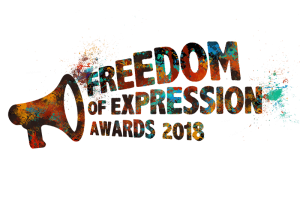
Index on Censorship Freedom of Expression Awards Fellowship 2018.
Ali left Azerbaijan in 2012 after being beaten in police detention for taking part in youth protests several months before the Eurovision Song Contest was held in the capital Baku. But he continued his challenge to the regime by releasing a video called Vermişel which he put out just before the Eurovision song contest. Ali’s protest song, covered by the UK’s Panorama programme among other international media, marred the government’s attempts at using the contest for positive publicity for the country, which lead to his nomination for the Index Awards in 2018.
After receiving word of the shortlist Ali said, “I was very glad to hear about my nomination. It’s motivating to know that what we do is important and appreciated. I’m working on new songs and trying to create a broader impact and to give a new hope to the people. The nomination is another chance for me to open my favorite topic and remind the international audience about our fight for freedom.”
See the full shortlist for Index on Censorship’s Freedom of Expression Awards 2018 here.[/vc_column_text][/vc_column][/vc_row][vc_row full_width=”stretch_row_content” equal_height=”yes” el_class=”text_white” css=”.vc_custom_1490259018105{background-color: #cb3000 !important;}”][vc_column width=”1/2″][vc_custom_heading text=”Support the Index Fellowship” font_container=”tag:p|font_size:28|text_align:center” use_theme_fonts=”yes” link=”url:https%3A%2F%2Fwww.indexoncensorship.org%2Fnewsite02may%2Fsupport-the-freedom-of-expression-awards%2F|||”][vc_column_text]
By donating to the Freedom of Expression Awards you help us support
individuals and groups at the forefront of tackling censorship.
Find out more
[/vc_column_text][/vc_column][vc_column width=”1/2″ css=”.vc_custom_1521221042825{background-image: url(https://www.indexoncensorship.org/newsite02may/wp-content/uploads/2017/05/2017-awards-fellows-1460×490-2_revised.jpg?id=90090) !important;background-position: center !important;background-repeat: no-repeat !important;background-size: cover !important;}”][/vc_column][/vc_row][vc_row][vc_column][vc_basic_grid post_type=”post” max_items=”4″ element_width=”6″ grid_id=”vc_gid:1521542168405-52acfb05-2fd8-4″ taxonomies=”10735″][/vc_column][/vc_row]
19 Mar 18 | News and features, Press Releases
[vc_row][vc_column][vc_column_text]Three former winners of the Freedom of Expression Journalism Award have written a letter in support of Index on Censorship’s media freedom month, which aims to raise £15,000 to support its work on media freedom over the next six months.
The three journalism fellows, Syrian Zaina Erhaim, Saudi Safa Al Ahmad and Maldivian Zaheena Rasheed spoke of their forced exiles from their home and families due to their career as journalists.
“None of us consider ourselves brave or courageous. We are not reckless. We are women who simply want to write and broadcast freely about what is happening in the world.”
They continue to do this, even as exiles. Erhaim works for the Institute for War and Peace Reporting, Rasheed for Al Jazeera, and Al Ahmad continues to work as a freelance journalist.
They shared their determination not to be silenced: “We need to speak out on media freedom. We need to support those speaking out. To continue to do this effectively in the challenging times ahead, Index needs your help.”
A donation of £20 ensures a verified attack against media freedom is mapped publicly online; a gift of £100 enables an official report to pressure governments; a gift of £1000 supports our work helping journalism fellows.
Read the full letter here.[/vc_column_text][/vc_column][/vc_row][vc_row][vc_column][vc_custom_heading text=”Mapping Media Freedom” use_theme_fonts=”yes”][vc_separator color=”black”][vc_row_inner][vc_column_inner width=”1/4″][vc_icon icon_fontawesome=”fa fa-times-circle” color=”black” background_style=”rounded” size=”xl” align=”right”][/vc_column_inner][vc_column_inner width=”3/4″][vc_column_text]
Since 24 May 2014, Mapping Media Freedom’s team of correspondents and partners have recorded and verified more than 4,000 violations against journalists and media outlets.
Index campaigns to protect journalists and media freedom. You can help us by submitting reports to Mapping Media Freedom.[/vc_column_text][/vc_column_inner][/vc_row_inner][vc_separator color=”black”][/vc_column][/vc_row][vc_row][vc_column][vc_custom_heading text=”Don’t lose your voice. Stay informed.” use_theme_fonts=”yes”][vc_separator color=”black”][vc_row_inner][vc_column_inner width=”1/2″][vc_column_text]Index on Censorship is a nonprofit that campaigns for and defends free expression worldwide. We publish work by censored writers and artists, promote debate, and monitor threats to free speech. We believe that everyone should be free to express themselves without fear of harm or persecution – no matter what their views.
Join our mailing list (or follow us on Twitter or Facebook) and we’ll send you our weekly newsletter about our activities defending free speech. We won’t share your personal information with anyone outside Index.[/vc_column_text][/vc_column_inner][vc_column_inner width=”1/2″][gravityform id=”20″ title=”false” description=”false” ajax=”false”][/vc_column_inner][/vc_row_inner][vc_separator color=”black”][/vc_column][/vc_row]
16 Mar 18 | Index Reports
Mapping Media Freedom has been recording threats to press freedom since 2014, highlighting the need for protection for journalists. The project monitors the media environment in 42 European and neighbouring countries. In 2017 1,089 reports of limitations to press freedom were verified by a network of correspondents, partners and other sources based in Europe, with a majority of violations coming from official or governmental bodies.
Six journalists were killed during 2017; 178 reports of assault or injury were made; 220 media workers were detained or arrested; 193 reports included criminal charges and lawsuits; there were 367 reports of intimidation, which includes psychological abuse, sexual harassment, trolling/cyberbullying and defamation; in 113 incidents media professionals had their property vandalised or confiscated; there were 178 instances of journalists or sources being blocked; and journalists’ work was altered or censored 68 times.
Read the full report here.
15 Mar 18 | Campaigns -- Featured, Media Freedom, media freedom featured, Statements
[vc_row][vc_column][vc_column_text]
Press freedom groups have urged the parliamentary committee considering a proposed new UK data protection law to drop amendments that would force news publishers to sign up to a state-backed regulator or face potentially crippling costs.
The Data Protection Bill had its second reading in the House of Commons on March 5 and now passes to the committee stage where it will be scrutinised by a cross party committee of MPs.
[/vc_column_text][/vc_column][/vc_row][vc_row][vc_column width=”1/4″][vc_icon icon_fontawesome=”fa fa-times” color=”black” background_style=”rounded” size=”xl” align=”right”][/vc_column][vc_column width=”3/4″][vc_column_text]
“The amendments proposed by the Lords reintroduce measures that the government has just said it plans to axe from legislation,” said Jodie Ginsberg, chief executive of Index on Censorship.
[/vc_column_text][/vc_column][/vc_row][vc_row][vc_column][vc_column_text]
On March 1 the UK government said it would not enforce Section 40 of the Crime and Courts Act. Had this section been enforced it would have meant that any organisation that refuses to sign up to a state-backed regulator could have faced crippling court costs in any dispute, whether they won or lost a case.
“We remain concerned about the prospect of this worrying cost-shifting provision under any guise. These measures threaten press freedom, and have no place in the Data Protection Bill,” said Rebecca Vincent, UK Bureau Director for Reporters Without Borders.
Clauses 168 and 169 of the Data Protection Bill effectively reintroduce the now defunct section 40 via another route because they would force all those news organisations who choose not to join a state backed regulator to pay the costs of data protection actions, even if the claim is unjustified.
Faced with the threat of crippling costs even if the courts found in their favour, news outlets might shy away from important public interest investigations.
Speaking during a Lords debate on the amendments earlier this year, crossbench peer Lord Pannick said the measures would have a “chilling effect”on the industry.
Antonia Byatt, Director of English PEN said: “We must make certain that in ensuring we respect an individual’s right to privacy we do not trample all over our free expression rights.”
[/vc_column_text][vc_basic_grid post_type=”post” max_items=”4″ element_width=”6″ grid_id=”vc_gid:1521114184076-36cd9369-d842-4″ taxonomies=”3895″][/vc_column][/vc_row][vc_row][vc_column][vc_custom_heading text=”Don’t lose your voice. Stay informed.” use_theme_fonts=”yes”][vc_separator color=”black”][vc_row_inner][vc_column_inner width=”1/2″][vc_column_text]Index on Censorship is a nonprofit that campaigns for and defends free expression worldwide. We publish work by censored writers and artists, promote debate, and monitor threats to free speech. We believe that everyone should be free to express themselves without fear of harm or persecution – no matter what their views.
Join our mailing list (or follow us on Twitter or Facebook) and we’ll send you our weekly newsletter about our activities defending free speech. We won’t share your personal information with anyone outside Index.[/vc_column_text][/vc_column_inner][vc_column_inner width=”1/2″][gravityform id=”20″ title=”false” description=”false” ajax=”false”][/vc_column_inner][/vc_row_inner][vc_separator color=”black”][/vc_column][/vc_row]
15 Mar 18 | About Index, Statements
Today marks a sad day for Index on Censorship. Today we recorded our 4,000th case of a media freedom violation in Europe. That’s 4,000 cases in which journalists have been harassed, threatened, arrested, jailed – or even killed. Four thousand cases. In just four years.
I became a journalist more than 20 years ago because I wanted to tell untold stories. I wanted people to know – and hopefully care – what was happening not just in their own country but globally. I expected it to be tough. I did not expect that death threats would become a daily part of existence for thousands of journalists.
And yet this is the situation in 2018. On my recent trip to Washington, two senior White House correspondents described, almost as an aside, how receiving death threats had become the norm. The cases reported to our Mapping Media Freedom project, which covers 42 countries in and neighbouring Europe, shows they are far from being alone.
Everywhere – from Finland to Croatia – journalists report receiving threats of violence on a regular basis. In some cases, this is more than a threat. As David Aaronovitch wrote last week, in the past six months alone two journalists have been killed for their work: in Malta and in Slovakia.
Imagine, as you read this, that you received such threats. Imagine what it would feel like.
At Index, we believe this should not be the norm – for anyone. Which is why we have created a project to document these and other threats to media freedom. We use this information to campaign for change. And we offer support to some journalists via our Freedom of Expression Awards Fellowship.
Please support our work today.
A donation of £20 ensures a verified attack against media freedom is mapped publicly online; a gift of £100 enables an official report to pressure governments; a gift of £1000 supports extensive fieldwork to identify and confirm reported violations.
Our goal is to raise at least £15,000 by the end of March. We raised £3,000 in the first four days of this campaign. Please help us to reach our target. Every contribution helps.
Yours,
Jodie
13 Mar 18 | Uncategorized
[vc_row][vc_column][vc_single_image image=”95278″ img_size=”full”][vc_column_text]Join Index on Censorship chief executive Jodie Ginsberg and nominees for this year’s Index Freedom of Expression Award for Journalism for a conversation about the challenges for local journalists reporting from some of the world’s most difficult environments.
Different forms of censorship can threaten journalists across the globe, be it state restrictions, political corruption, social taboos, all of these are barriers that nominees have had to push through to bring a story to light.
Index on Censorship’s Freedom of Expression Awards exist to celebrate individuals or groups who have had a significant impact fighting censorship anywhere in the world. Awards are offered in four categories: Arts, Campaigning, Digital Activism and Journalism.
The evening will be celebrating past and potential future winners in the field of journalism.
Speakers include Wendy Funes, a journalist based in Honduras, whose father and friends are among the reporters killed there for their work – killings for which no one has ever been brought to justice. As well as reporting on corruption in the country, Funes covers violence against women in Honduras, where one woman is killed every 16 hours. Funes is one of four nominees shortlisted for the Index on Censorship Freedom of Expression Award for Journalism, which will be announced on April 19 in London.
Zaina Erhaim is a former Index Freedom of Expression Award winner and the winner of the 2015 Peter Mackler Award for Courageous and Ethical Journalism. A Syrian journalist, Erhaim has been working for IWPR in Syria and Turkey since 2013 supporting journalists, civil society groups, and youth and female activists. Since February 2015, Erhaim has led the Women’s Blog project at IWPR, carrying pieces by new writers with no background in professional journalism, talking about the hardship of daily life and the horrors of war. Erhaim has been instrumental in bringing these stories out.
Jodie Ginsberg is a former foreign correspondent and was London bureau chief for Reuters from 2007-2011.[/vc_column_text][/vc_column][/vc_row][vc_row][vc_column width=”1/3″][vc_single_image image=”80210″ alignment=”center”][vc_column_text]
Jodie Ginsberg
[/vc_column_text][/vc_column][vc_column width=”1/3″][vc_single_image image=”74834″ alignment=”center”][vc_column_text]
Zaina Erhaim
[/vc_column_text][/vc_column][vc_column width=”1/3″][vc_single_image image=”98502″ alignment=”center”][vc_column_text]
Wendy Funes
[/vc_column_text][/vc_column][/vc_row][vc_row][vc_column][vc_column_text]
This event has been cancelled. We apologise for any inconvenience.
[/vc_column_text][/vc_column][/vc_row]
13 Mar 18 | Media Freedom, media freedom featured, News and features, Press Releases
[vc_row][vc_column][vc_single_image image=”98546″ img_size=”full” alignment=”center”][vc_column_text]UK-based freedom of expression organisation Index on Censorship recorded its 4,000th case of a media freedom violation in 42 countries around Europe on Monday.
Index has been mapping threats to journalists and media organisations in Europe and neighbouring countries since 2014. The map covers a wide range of threats to journalists: from online harassment to changes in the law that hamper the ability of journalists to report freely.
The 4,000th case was the arrest of Turkish journalist Muhammet Doğru, a reporter for Kurdish news agency Dicle, who was given a six-year suspended prison sentence for membership of a “terrorist organisation”. He was also sentenced to an additional two years and three months for spreading propaganda.
Doğru had already served 10 months in pre-trial detention.
Speaking after the hearing, Doğru said he would continue doing his job despite the sentence. “Many colleagues… We will continue to protect the dignity of journalism and fulfil our responsibility,” he said. “These sentences will not scare journalists”.
Although Turkey is often singled out as the worst offender for media freedom in the region, the 4,000 cases reported to the map, which covers 42 countries, in the past four years show that threats to the work of journalists are growing across Europe.
Across Europe – from Finland to Croatia – journalists report receiving threats of violence on a regular basis. In some cases, this is more than a threat. As Times journalist and Index chair David Aaronovitch wrote to Index on Censorship supporters last week, in the past six months alone two EU journalists have been killed for their work: in Malta and in Slovakia.
In a letter, Jodie Ginsberg, Index CEO, told supporters that the organisation is aiming to raise £15,000 in March for its work mapping threats to media freedom and its work campaigning against attacks on journalists, journalism and the public’s right to be informed. [/vc_column_text][/vc_column][/vc_row][vc_row][vc_column][vc_custom_heading text=”Mapping Media Freedom” use_theme_fonts=”yes”][vc_separator color=”black”][vc_row_inner][vc_column_inner width=”1/4″][vc_icon icon_fontawesome=”fa fa-times-circle” color=”black” background_style=”rounded” size=”xl” align=”right”][/vc_column_inner][vc_column_inner width=”3/4″][vc_column_text]
Since 24 May 2014, Mapping Media Freedom’s team of correspondents and partners have recorded and verified more than 4,000 violations against journalists and media outlets.
Index campaigns to protect journalists and media freedom. You can help us by submitting reports to Mapping Media Freedom.
[/vc_column_text][/vc_column_inner][/vc_row_inner][vc_separator color=”black”][/vc_column][/vc_row][vc_row][vc_column][vc_custom_heading text=”Don’t lose your voice. Stay informed.” use_theme_fonts=”yes”][vc_separator color=”black”][vc_row_inner][vc_column_inner width=”1/2″][vc_column_text]Index on Censorship is a nonprofit that campaigns for and defends free expression worldwide. We publish work by censored writers and artists, promote debate, and monitor threats to free speech. We believe that everyone should be free to express themselves without fear of harm or persecution – no matter what their views.
Join our mailing list (or follow us on Twitter or Facebook) and we’ll send you our weekly newsletter about our activities defending free speech. We won’t share your personal information with anyone outside Index.[/vc_column_text][/vc_column_inner][vc_column_inner width=”1/2″][gravityform id=”20″ title=”false” description=”false” ajax=”false”][/vc_column_inner][/vc_row_inner][vc_separator color=”black”][/vc_column][/vc_row]
08 Mar 18 | Global Journalist (Arabic), Journalism Toolbox Arabic
[vc_row][vc_column][vc_custom_heading text=”
تبتكر النساء الكرديات في الموقع الإخباري النسوي الوحيد في تركيا ، جين نيوز ، ووسائل اعلامية أخرى نهجا جديدًا في الصحافة في تركيا، لكنهن يتعرّضن للضغط ولقد تم احتجاز العديد منهن أو تم تقديمهن للمحاكمة أو حتى تهديدهن.”][vc_row_inner][vc_column_inner][vc_column_text]
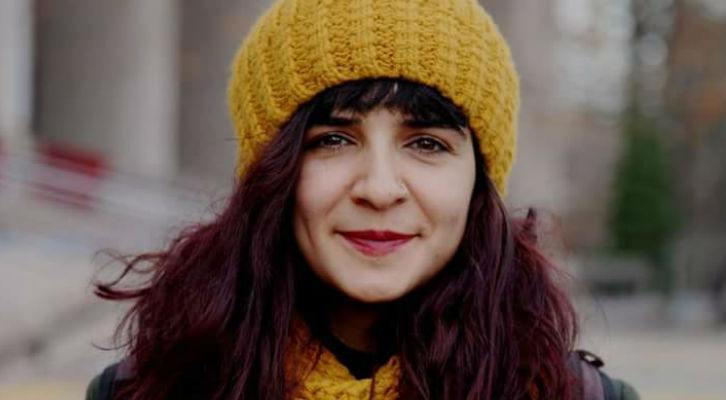 [/vc_column_text][/vc_column_inner][/vc_row_inner][/vc_column][/vc_row][vc_row][vc_column][vc_column_text]
[/vc_column_text][/vc_column_inner][/vc_row_inner][/vc_column][/vc_row][vc_row][vc_column][vc_column_text]
يحتفل هذه الأيام موقع الأخبار النسوية الوحيد في تركيا باليوم العالمي للمرأة ولكن تحت رقابة الدولة. فلقد تم حجب الوصول إلى الموقع الإلكتروني الخاص بـ “جين نيوز” (جين تعني “امرأة” باللغة الكردية)، والذي تديره النساء بالكامل ويركز تحديدًا على الأخبار المتعلقة بالنساء ، تم حجبه سبع مرات خلال أسبوع واحد فقط في نهاية يناير، وفي الوقت الحالي، لا يمكن الوصول إلى الموقع من داخل تركيا.
لكن هذه الضغوطات لم تنجح في تثبيط عزيمة الصحفيات في “جين نيوز”. تقول محّررة الأخبار في الموقع بيريتان الياقوت: “لقد أظهرنا دوما أن لدينا بدائل ، ونحن مستمرون في إظهارها”. تعتمد “جين نيوز” على الشبكات الاجتماعية واستخدام الشبكات الافتراضية الخاصة، ولقد أعلنت انشاء قناة تلفزيونية جديدة بمناسبة اليوم العالمي للمرأة ، الذي له أهمية مزدوجة بالنسبة لهم. فلقد تأسست “جينها” ، وهي أول وكالة أنباء تديرها نساء في البلاد ، أيضا في اليوم العالمي للمرأة قبل ست سنوات.
ان الضغوطات ليست شيئا جديدا عليهن ، اذ تم اغلاقهم مرتين في السابق، وهذا أكثر مما حدث مع أي وسيلة إخبارية أخرى في البلاد حتى في ظل حالة الطوارئ الحالية. أولاً ، تم إغلاق “جينها” بناء على مرسوم صادر في أكتوبر ٢٠١٦. ولم يسمح لـ “غازيتي سوجين” ، خليفة “جينها” ، بالعمل لأكثر من تسعة أشهر قبل صدور قرار آخر بإغلاقها في أغسطس ٢٠١٧.
على الرغم من ذلك، بعثت “جين نيوز” من الرماد ، حاملة معها إرث وكالة “جينها” النسائي، ويتضمن ذلك الكتابة بأسلوب يضع النساء “كفاعلات لا كمفعولات بهن” في الحدث. كما يحرص الموقع على استخدام اللغة الواعية ، مثل استخدام كلمة “قتلت غيلة” بدلا من “قتلت” للتأكيد على عنف الذكور. كما أنها تتجنب ابراز أي تفاصيل قد تبرر العنف ضد المرأة بشكل غير مباشر (على سبيل المثال من خلال رفض ملاحظة أن الضحية كانت تسعى إلى الطلاق) أو تقديم تفاصيل وصفية غير ضرورية في حالات الاعتداء الجنسي. ثم هناك استخدام الموقع الصارم للأسماء الأولى بدلاً من أسماء العائلة – وهي الممارسة التي اعتمدتها هذه المقالة لتقديم لمحة عن منهاجيتهن.
تقول بيريتان: “عند تغطية شؤون النساء ، كان علينا التفكير حتى في أصغر التفاصيل. لقد اخترنا عدم استخدام اسم العائلة لكسر المفهوم القائل بأن السلالة يجب أن تنحدر من الرجال. إذا قلنا بيريتان الياقوت في بداية المقال لتقديم شخص ما ، فإننا نستخدم الاسم (الأول) الذي يميز هذا الشخص”.
حتى كبار المسئولين، بمن فيهم رئيسان سابقان للحزب الديمقراطي الشعبي المؤيد للأكراد ، واللذان الآن هما قيد الاعتقال ، فيجن يوكسكاديتش وصلاح الدين ديميرتاش ، لم يتم اعفاؤهما من هذه القاعدة.
هذا يعني أيضا مقاربة مختلفة في اختيار المواضيع. “نحن لا نغطي الأخبار المتعلقة بالهجوم الجنسي أو الاعتداء الجنسي أو التحرّش. بدأنا في تغطية القصص التي تركّز على النساء كأفراد قويات، وعلى النساء الرائدات. ركزنا على الاقتصاد والبيئة. لقد جعلنا النساء مرئيات في السياسة ، وأبرزناهن وأعطيناهن صوتًا “.
تشجيع النساء على التحدث
لضمان عدم تكميم أفواه النساء ، تستخدم “جين نيوز” حصريا شهادات واقتباسات من النساء في تقاريرها. تقول الصحفية شريبان أصلان وهي تتجه إلى السوق الشعبي في باولار في ديار بكر ، أن ردود فعل النساء دائمًا ما تكون إيجابية للغاية عندما تقوم الوكالة بتقديم نفسها كهيئة كردية تغطي شؤون النساء.
بعد وصولها إلى السوق ، تسير شريبان وزميلتها ، رينجين عزيز أوغلو ، بهدوء بينما تبحثان عن نساء يدرن متاجر. موضوع تغطيتهما هو تدمير مركز صحي محلي، الذي تم تحويله إلى مركز للشرطة من قبل وصي معين من الحكومة وذلك بعد أن ألقى رؤساء البلديات المنتخبين في السجن.
يظهر التأثير فوراً عند دخولهن الى محل لبيع الهدايا، فتوافق احدى البائعات على إجراء المقابلة معهما. تقول لها شريبان “هناك تصور في المجتمع أن المرأة لا يمكنها أن تعمل ولكنك حطمتي هذا التصور” فتجيب الامرأة دون تردد: “قطعاً”. عندما تقترب المقابلة من نهايتها ، تسألها شريبان إذا كانت لديها أي رسائل تريد توجيهها إلى نساء أخريات فتقول: “يجب على كل النساء أن تعمل… لا ينبغي أن تستسلمن إلى الرجال”.
تقول شريبان: “تشعر النساء بالراحة والثقة عندما يتحدثن إلينا… وكوننا وكالة كردية فان ذلك يساعد أيضًا”.
سألها رجل وهي تخرج من متجر: “من أي وكالة أنت؟” ترد شريبان “نحن من وسائل الإعلام الحرة”، مستخدمة وهو التعبير الذي يشير به الأكراد إلى وسائل الإعلام الخاصة بهم، فيرحب بها بحرارة.
تشدد مونتيفير كارادمير ، محررة “جين نيوز” باللغة الكردية ، على أهمية عامل التشجيع هذا. تقول: “عندما تعطيهن الثقة للتعبير عن أنفسهن ، فإن النساء يحضنونك”…عندما تخبر أي بائع متجر أنا من وكالة تديرها امرأة تركّز على مشاكل النساء، فإن موقفها يصبح مختلفاً للغاية. إنها تشعر بالأمان وأنها قادرة على إخبارك بما تمر به. “
كما أن صحفيات “جين نيوز” يتوقنّ إلى توسيع نطاق الخبرة التي يبنينها مع وسائل اعلامية أخرى، وخاصة مع الصحافيين الذكور. فهن لديهن الآن مشروع لإعداد قاموس من أجل لغة إخبارية غير تمييزية. تقول بيريتان “كنا نخطط للاجتماع مع الرجال وتنظيم ورشات تدريب حول” كيفية تصميم قصة إخبارية “و” كيفية استخدام لغة صديقة للمرأة في المقالات الإخبارية “ولكن لم نتمكن من ذلك بسبب الظروف [في المنطقة]”.
ومع ذلك ، فإن مجرد وجودهن بدأ بالفعل في تعزيز الوعي العام. تضيف: “بعض الصحفيين ، وهم من الرجال في معظم الأحيان ، يسألوننا:” هل تريدون التحقق من هذا التقرير وما إذا كنا قد استخدمنا اللغة الصحيحة؟ إنهم يشعرون الآن بالقلق”. ولقد كان أحد أهم النجاحات التي حققتها بيريتان هو إظهار أن النساء هن أكثر من قادرات على الانخراط في العمل الصحافي – ربما بشكل يتفوق على عمل الرجال. “رأينا أن المرأة كانت سريعة كذلك. ولكن هذه السرعة تسعى أيضًا إلى مشاركة الخبر بأفضل طريقة ممكنة. فلقد كنّ دقيقات في عملهن “.
صحافيات ينشئن منصة ضد الضغوط
وفقا لبيريتان ، كانت سياسة “جين نيوز” لجمع أصوات النساء وحدهم أكثر نجاحا في الشرق مقارنة مع غرب تركيا. كان ذلك نتيجة سياسة “التكافؤ بين الرؤساء” الصارمة التي أطلقها الحزب الديمقراطي الشعبي، والتي ضمنت للنساء تولي مناصب رفيعة في البلديات الكردية. لكن بعد أن احتل الأمناء المعينين من الحكومة معظم البلديات التي يقودها الحزب الديمقراطي الشعبي، لم تفقد “جين نيوز” مصادرها النسائية هناك فحسب – اذ أن معظم الأمناء هم من الرجال – ولكنهم فقدوا مصدراً مهماً للدخل، فالعديد من عضوات المجالس البلدية كن من المشتركات في خدماتهن وكن يشجعن أنشطة الوكالة الإخبارية هذه.
ومنذ بدء الحملات العسكرية في المراكز الحضرية في المنطقة ، أصبح الصحفيون هدفاً لأجهزة الأمن التابعة للدولة، وأصبح الاعتقال والاحتجاز من الممارسات الشائعة ضدهم. “أرادت الدولة عزلنا في منازلنا من خلال الاعتقالات. وعندما لم يفلح ذلك ، حاولوا إغلاق الوسائل الاعلامية بالكامل” تقول بيريتان وهي تتلقى خبرا مفاده أن أحد مراسلاتها ، دوركيت سورين ، قد اتُهمت بـ “الانتماء إلى منظمة إرهابية وتمويلها” بعد احتجازها قبل عدة أيام عند نقطة تفتيش. في نهاية المطاف تم إطلاق سراح دوركيت من قبل المحكمة بعد حظر السفر عليها وأمرها بزيارة مركز للشرطة بانتظام.
لم تكن دوركيت الصحفية الوحيدة من “جين نيوز” التي تواجه اتهامات جنائية اذ تقضي حالياً مراسلة صحيفة “جينها” السابقة ، زهرة دوغان ، حكماً بالسجن لمدة سنتين وتسعة أشهر بتهمة “نشر دعاية منظمة إرهابية”. وكانت قد أُدينت بعد نشرها شهادة بنت في العاشرة من العمر متأثرة بالعملية العسكرية التركية ضد بلدة نصيبين في مقال من كانون الأول / ديسمبر ٢٠١٥. كما تلقت زهرة ، وهي رسّامة أيضا ، حكما بالسجن “لرسمها الأعلام التركية على المباني المدمرة” في لوحة تم نسخها من صورة حقيقية تظهر الأعلام التركية على المباني التي دمرتها القوات التركية. كما تلقت بيريتان كانوزر، مراسلة الوكالة في اسطنبول ، وأيصل إشيك، أحكاما بالسجن أيضاً. واعتُقل كثيرون غيرهن ، حيث يخضع ١٠ مراسلين للمحاكمة حالياً كما تتلقى الوكالة تهديدات بشكل دوري.
تقول عيشه غون ، وهي مراسلة وكالة” ميزوبوتاميا” الكردية والمتحدثة باسم منصة صحافيات ميزوبوتاميا، أن عنف الدولة قد أصبح اليوم ممارسة روتينية. “في مقاطعة مثل شرناق، تتعرض صحافياتنا باستمرار للمضايقات أو التهديدات اللفظية. نتجنب الكثير منهن الذهاب وحدهن إلى القرى أو الى بعض الأحياء. وهن يتعرضن للتهديد ، من الاختطاف إلى التعدّي عليهم أو الاغتصاب. قد تكون التهديدات لفظية في الوقت الراهن، لكن هناك محاولة جادة لتخويفهن.”
تم تأسيس المنصة في عام ٢٠١٧ في يوم رمزي آخر ، يوم حرية الصحافة في ٣ مايو / أيار ، وكان الهدف ضمان قدرة النساء على النضال من اجل القضايا المشتركة. وتشمل هذه القضايا الاجتماعية – مثل البطالة بعد الإغلاق المتكرر للوسائل الإعلامية الكردية في ديار بكر – ولكن أيضا ضد كل أنواع العنف. تقول عيشه: “بفضل هذه المجموعة ، أردنا مساعدة أصدقائنا الذين يتم اعتقالهم أو احتجازهم أو الذين يتعرضون للمضايقات من مصادرهم أو الاعتداء عليهم أو إساءة معاملتهم من قبل الشرطة. كما أردنا أن نجعل الضغط مرئيًا للجميع”.
آخر الصحافيات اللواتي اعتقلتهن الشرطة هي سيدا تاسكين ، التي كانت تكتب تحقيقا في مقاطعة موش. تم إطلاق سيدا بشكل مشروط، ليتم اعتقالها بعد شهر مجددا في أنقرة بسبب تقاريرها وتغريداتها.
وفقا لعيشه، فإنه ليس من قبيل المصادفة أن التجربة الصحافية للمرأة بدأت في ديار بكر ، وليس – كما كان متوقعا – في اسطنبول. “إن شعبنا يعرف كيف يعيش في ظل أوضاع صعبة. المرأة الكردية تعرف كيف تقاوم. تم إغلاق “جينها” فتم إنشاء “سوجين”. تم إغلاق “سوجين” فتم إنشاء “جين نيوز”، مما يعني أنه يمكننا إعادة اختراع أنفسنا مرارًا وتكرارًا”، نقول قبل أن تضيف: “نحن نتحدث هنا عن حرية المرأة وليس المساواة بين الجنسين. هذا شيء يذهب أبعد بكثير”.
كما قالت عيشه إنها ترغب في توجيه دعوة إلى جميع الصحفيات في تركيا للتضامن معهن. تقول:”لا يكاد يوجد أي صحفي هنا لم تقام محاكمة له. هم إما يظلون بين السجن وخارجه أو يجب عليهم زيارة مركز الشرطة كل يومين أو ثلاثة أو حتى خمسة أيام. هذا يعني أنهم لا يستطيعون مغادرة المدينة ، التي أصبحت سجنًا في الهواء الطلق.” ثم تضيف: “لكن هذا لا يحدث للأكراد فقط. هذا يحدث في كل مكان. لذلك هذا هو الوقت المناسب لأن نعمل معا “.
أوزغون أزوكير
أوزغون أزوكير هو صحفي ومسؤول في منصة الصحافة المستقلة في اسطنبول. وقد عمل في العديد من وسائل الإعلام التركية بما في ذلك “طرف”، وصحيفة حرييت و”بيرغوم”. كما عمل في عدد من المنظمات غير الحكومية ، مثل منظمة اليونيسيف في تركيا ومنظمة العفو في تركيا.
[/vc_column_text][/vc_column][/vc_row]
08 Mar 18 | News and features, Turkey, Turkey Uncensored
[vc_row][vc_column][vc_media_grid grid_id=”vc_gid:1520507629250-860b1635-f01a-8″ include=”98413,98412,98411,98410,98409,98408″][vc_column_text]The only online feminist news website in Turkey is marking International Women’s Day under state censorship. Access to the website of Diyarbakır-based Jin News (“Jin” meaning “woman” in Kurdish), which is entirely run by women and specifically focuses on news relating to women, was blocked seven times within just one week at the end of January. At present, the site is inaccessible from Turkey.
The pressure, however, hasn’t discouraged Jin News’ journalists. “We have always shown that we have alternatives, and we are continuing to show it,” Jin News Editor Beritan Elyakut told Index on Censorship. While relying on social media and the use of VPNs, Jin News announced a new TV channel to mark the symbolic day, which has a double significance for them. JINHA, the first news agency run by women in the entire country, was also established on an International Women’s Day six years ago.
Pressure was no stranger to them either: They were shut down not once but twice, more than any other news outlet in the country under the present state of emergency. First, JINHA was closed by decree in October 2016. Gazete Şujin, JINHA’s successor, was only allowed to exist for nine months before another decree ordered its closure in August 2017.
But still, from its ashes, Jin News was born, taking over JINHA’s legacy: a style of news writing that presents women “as subjects, not objects.” The site takes care to use conscientious language, such as using the word “murdered” instead of “killed” to emphasise male violence. They also avoid highlighting details that indirectly justify violence against women (by refusing, for example, to note that she was seeking a divorce) or providing unnecessary descriptive details in cases of sexual attack. Then there is the strict use of first names instead of family names – a practice adopted by the present article to provide a glimpse of their methodology.
“When covering women, we had to think until the smallest details. We chose not to employ the family name to break the perception that family lineage descended from men. If we say ‘Beritan Elyakut’ in the beginning of the article to introduce a person, we then use the name distinguishing that person as a subject,” Beritan said. Even the highest-ranking officials, including two former co-chairs of the pro-Kurdish Peoples’ Democratic Party (HDP) who are currently under arrest, Figen Yüksekdağ and Selahattin Demirtaş, wouldn’t escape the rule.
This also meant a different approach in the choice of topics. “We don’t just cover news on sexual attack, sexual abuse or harassment. We started to cover stories reflecting women as strong individuals. We reported on pioneering women. We focused on economy and ecology. We made women visible in politics, highlighted them and gave them a voice,” Beritan said. [/vc_column_text][/vc_column][/vc_row][vc_row][vc_column width=”1/4″][vc_icon icon_fontawesome=”fa fa-times” color=”black” background_style=”rounded” size=”xl” align=”right”][/vc_column][vc_column width=”3/4″][vc_column_text]
“Our people know how to live under difficult situations. Kurdish women know how to resist. JINHA was closed, and Şujin was created. Şujin was closed and Jin News was created, which means we can reinvent ourselves over and over.”
[/vc_column_text][/vc_column][/vc_row][vc_row][vc_column][vc_column_text]Encouraging women to speak up
To ensure that women’s voices are not muted, Jin News uses exclusive testimonies and quotes from women in their reports. As she walks to the popular market of Bağlar in Diyarbakır, reporter Şehriban Aslan tells Index on Censorship that women’s reactions are always very positive when they introduce themselves as a Kurdish agency covering women.
Once she arrives at the market, Şehriban and her colleague, Rengin Azizoğlu, walk quietly as they search for women running stores. The subject is the destruction of a community health centre, which was turned into a police station by a government-appointed trustee after the municipality’s democratically elected co-mayors were thrown in jail.
The effect is immediate as they enter a gift shop. One of the vendors agrees to be interviewed. “There is this perception in society that a woman can’t work. You’ve broken it,” Şehriban tells her. “Absolutely,” the woman answers, without a flinch of hesitation. As the interview nears its end, Şehriban asks her if she has any messages to other women. “Women should absolutely work,” she says. “They shouldn’t submit to men.”
“Women feel comfortable and confident when they speak to us,” Şehriban says. “Being a Kurdish agency also helps.”
“Which outlet are you from?” a man asks her as she sneaks out of a shop. “We are the free media,” Şehriban says, using the expression that Kurds refer to their own media outlets. “Ah, you are more than welcome,” he replies.
Münevver Karademir, Jin News’ Kurdish-language editor, also stresses the importance of the encouragement factor. “When you give them confidence to express themselves, women embrace you,” Münevver says. “When you tell any shop vendor ‘I am an agency run by woman who works on the problems of women,’ her attitude becomes very different. She feels safe. She is able to tell you what she is going through.”
Jin News journalists are also eager to expand the know-how they are building with other outlets, especially male journalists. They have a project to prepare a dictionary on non-discriminatory news language. “We were planning to come together with men and organize training on ‘how to design a news story’ and ‘how to use women-friendly language in news articles’ but haven’t been able to due to the conditions [in the region],” Beritan says.
However, their mere presence has already started to raise some awareness. “Some journalists, men most of the time, ask us: ‘Would you check this story and see if we have used correct language?’ They now feel that concern,” she says. One of the most important successes for Beritan has been to show that women were more than capable of doing journalism – often better than men. “We saw that women were fast as well. But their speed also seeks to share a story in the best way possible. They were meticulous.”
Women journalist establish platform against pressure
According to Beritan, Jin News’ policy of collecting women’s voices alone was more successful in the east than the west of Turkey. This is the result of the strict “co-chair parity” policy launched by the HDP, which ensured that women assumed senior positions in Kurdish municipalities. However, after trustees occupied most HDP-led municipalities, Jin News not only lost its interlocutors – most trustees are men – but lost an important source of revenue. Indeed, many women co-chairs ensured that the municipality subscribed to their services and encouraged the agency’s activities.
Since the military crackdowns in urban centers in the region, journalists have become a target of state security agencies, and arrests and detentions have become common practices.
“The state wanted to seclude us at home through detentions. When that didn’t work, they tried to shut down the outlets entirely,” Beritan says as she learns that one of their reporters, Durket Süren, has been charged with “membership in and financing of a terrorist organisation” after being detained a few days earlier at a routine checkpoint. Durket was eventually released by a court but was subjected to a travel ban and ordered to sign in regularly at a police station.
Durket is hardly the only Jin News journalist facing criminal charges. Former JINHA reporter Zehra Doğan is currently serving a two-year, nine-month prison sentence for “spreading propaganda for a terrorist organisation.” She was convicted for publishing the testimony of a 10-year-old girl affected by the Turkish military operation on the town of Nusaybin in an article from December 2015. Also a painter, Zehra received jail time for “drawing Turkish flags on destroyed buildings” in a painting copied from a real photograph in which Turkish flags can be seen on buildings destroyed by Turkish forces. Beritan Canözer, the agency’s Istanbul reporter, and Aysel Işık have also served prison sentences. Many have been detained, and about 10 reporters are currently on trial. The agency also receives regular threats.
Ayşe Güney, a reporter for the Kurdish Mezopotamya Agency and spokeswoman for the Mezopotamya Women Journalists Platform, told Index on Censorship that state violence has become routine practice. “In a province like Şırnak, our reporters are constantly subjected to verbal harassment or threats. Many avoid going alone to villages or certain neighbourhoods. They are threatened, from being kidnapped to being abused or raped. Threats may be verbal for now, but there is a serious attempt to intimidate them,” she says.
The platform was established in 2017 on another symbolic day, May 3 Press Freedom Day, to ensure that women can fight together against common issues. Those include social issues – such as unemployment after the repeated closure of Diyarbakır-based Kurdish media outlets – but also against all kinds of violence. “Thanks to this association, we wanted to help our friends who are detained, arrested or subject to harassment from sources, attacked or abused by the police. We also wanted to make the pressure visible,” Ayşe says.
The latest woman journalist to be arrested by police is Seda Taşkın, who was reporting a story in the province of Muş. Seda was first released on probationary conditions, only to be arrested a month later in Ankara due to her reporting and tweets.
According to Ayşe, it is no coincidence that the women’s journalistic experiment began in Diyarbakır and not – as some might have expected – in Istanbul. “Our people know how to live under difficult situations. Kurdish women know how to resist. JINHA was closed, and Şujin was created. Şujin was closed and Jin News was created, which means we can reinvent ourselves over and over,” Ayşe says. “We are speaking here about women’s freedom and not gender equality. This is something that goes way beyond it.”
Ayşe also said she wished to make a call on all women journalists in Turkey to engage in solidarity. “There are almost no journalists here who haven’t had a trial opened against them. Either they have been in and out of prison or have to report at a police station every two or three or even five days. This means they can’t leave the city, which is becoming an open-air prison,” Ayşe says. “But it doesn’t happen only to Kurds anymore. It happens everywhere. So this is the time to act together.”[/vc_column_text][/vc_column][/vc_row][vc_row][vc_column][vc_basic_grid post_type=”post” max_items=”12″ style=”load-more” items_per_page=”4″ element_width=”6″ grid_id=”vc_gid:1520507629256-32297f2b-810d-7″ taxonomies=”8607″][/vc_column][/vc_row]
08 Mar 18 | Awards, News and features
[vc_row][vc_column][vc_column_text]From a journalist issued death threats for her investigative work and a activist who helps women and girls learn computer programming to foster female economic independence, to an organisation that provides support for female victims of online harassment, the 2018 Index on Censorship Freedom of Expression Awards shortlist includes women who work with bravery and persistence in the face of adversity.
On International Women’s Day, we celebrate and honour the amazing women on our awards shortlist.
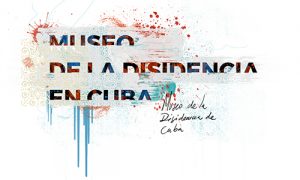 The Museum of Dissidence was co-founded by curator Yanelys Nuñez Leyv in Cuba. Nuñez Leyva was previously a staff writer at a magazine published by the ministry of culture until she was fired for her involvement with the museum. Despite this, she has continued her involvement with the museum organising radical public art projects and installations. The museum also seeks to reclaim a positive notion of the word “dissident” in Cuba.
The Museum of Dissidence was co-founded by curator Yanelys Nuñez Leyv in Cuba. Nuñez Leyva was previously a staff writer at a magazine published by the ministry of culture until she was fired for her involvement with the museum. Despite this, she has continued her involvement with the museum organising radical public art projects and installations. The museum also seeks to reclaim a positive notion of the word “dissident” in Cuba.
 The women-run campaign Open Stadiums asserts a woman’s rights to attend public sporting events in Iran. The campaign challenges the country’s current religious and political regime while engaging women in human rights conversations previously deemed unimportant. Iranian women face many restrictions in public spaces and Open Stadiums has generated conversations on their right to attend public events which is currently a taboo in the country.
The women-run campaign Open Stadiums asserts a woman’s rights to attend public sporting events in Iran. The campaign challenges the country’s current religious and political regime while engaging women in human rights conversations previously deemed unimportant. Iranian women face many restrictions in public spaces and Open Stadiums has generated conversations on their right to attend public events which is currently a taboo in the country.
 Digital Rights Foundation is a cyber-harassment hotline based in Pakistan that helped over one thousand women in its first year. DRF provides a harassment helpline team which includes a digital security expert, a trained lawyer and a qualified psychologist, all of which can provide specialised assistance to women.
Digital Rights Foundation is a cyber-harassment hotline based in Pakistan that helped over one thousand women in its first year. DRF provides a harassment helpline team which includes a digital security expert, a trained lawyer and a qualified psychologist, all of which can provide specialised assistance to women.
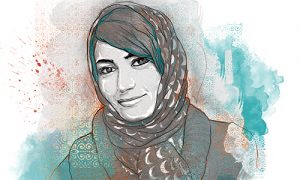 Digital Activism nominee Fereshteh Forough is the founder of Code to Inspire, a project that helps women and girls learn to code. The programme fosters female economic independence and broaden commercial opportunities for women in a patricahal society.
Digital Activism nominee Fereshteh Forough is the founder of Code to Inspire, a project that helps women and girls learn to code. The programme fosters female economic independence and broaden commercial opportunities for women in a patricahal society.
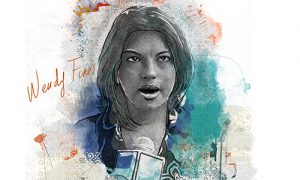 Journalist Wendy Funes risks her life for the right to report in Honduras. Journalists in the country face a harsh and repressive environment, but Funes continues to report on corruption, injustice and violence against women in a country where one woman on average is killed every 16 hours. [/vc_column_text][/vc_column][/vc_row][vc_row][vc_column][vc_basic_grid post_type=”post” max_items=”2″ element_width=”12″ grid_id=”vc_gid:1520503493497-3165bd85-48fb-3″ taxonomies=”10735″][/vc_column][/vc_row]
Journalist Wendy Funes risks her life for the right to report in Honduras. Journalists in the country face a harsh and repressive environment, but Funes continues to report on corruption, injustice and violence against women in a country where one woman on average is killed every 16 hours. [/vc_column_text][/vc_column][/vc_row][vc_row][vc_column][vc_basic_grid post_type=”post” max_items=”2″ element_width=”12″ grid_id=”vc_gid:1520503493497-3165bd85-48fb-3″ taxonomies=”10735″][/vc_column][/vc_row]




 [/vc_column_text][/vc_column_inner][/vc_row_inner][/vc_column][/vc_row][vc_row][vc_column][vc_column_text]
[/vc_column_text][/vc_column_inner][/vc_row_inner][/vc_column][/vc_row][vc_row][vc_column][vc_column_text] The Museum of Dissidence
The Museum of Dissidence The women-run campaign
The women-run campaign  Digital Rights Foundation
Digital Rights Foundation Digital Activism nominee
Digital Activism nominee  Journalist
Journalist